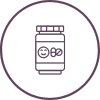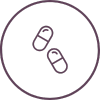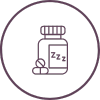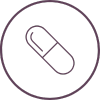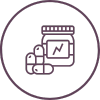
Written by:

Medically Reviewed by:
Last Updated:
January 15th, 2025
Prescription Drug Addiction | Types, Symptoms and Effects
Prescription drug addiction is a serious and often underestimated problem in the UK. People often overlook the dangers associated with using prescribed medications – such as opioid painkillers and benzodiazepines to treat anxiety – but it is important to be aware that even these prescribed drugs can lead to serious issues when taken in excess or other than they are intended.
Tragically, many people are unaware of their prescription drug addiction until it has already taken hold of their lives. If this is the case for you and you believe you could have an addiction to prescription drugs, Recovery Lighthouse is here to help.
How does prescription drug addiction develop?
There are two main paths that can lead to prescription drug addiction, the first being a prescription from your doctor and the second being recreational use.
A prescription from your doctor
Prescription drugs like opioids, benzodiazepines and sleeping pills all have their place in the medical field. For example, if you are suffering from acute pain, your doctor may prescribe an opiate like codeine to help ease your symptoms. While these drugs have completely legitimate purposes, their use also has the potential for addiction if taken outside of a doctor’s instructions (and even when following instructions, in some cases.)
For many, prescription drug addiction begins when they take higher or more frequent doses of their medication. This interferes with neurotransmitters in the brain, notably gamma-aminobutyric acid (GABA) which is responsible for feelings of calmness. Disruptions to these chemicals in the brain can facilitate a dependency, eventually resulting in the need to take prescription drugs just to feel normal.
Recreational use
It is possible that prescription drug addiction can also occur as a result of recreational use, whereby you take the drugs for their pleasurable effects. Depending on the type of drug, effects can include feelings of relaxation, alertness, focus and even euphoria in some cases. These seemingly positive side effects stimulate the reward centre in your brain which makes you want to take more of them.
As such, it is very easy to slip into regular use of prescription drugs, turn to them when you are feeling stressed or seek them out as a way to relax. However, due to their highly addictive nature, dependency and addiction can quickly materialise, leaving you at risk of numerous physical and mental side effects.
Types of potentially addictive prescription drugs
Antidepressant addiction
Learn more about the signs, symptoms and effects of an antidepressant addiction.
Benzodiazepine addiction
Learn more about the signs, symptoms and effects of a benzodiazepine addiction.
Sleeping pill (Z-drug) addiction
Learn more about the signs, symptoms and effects of a sleeping pill addiction.
Opioid addiction
Learn more about the signs, symptoms and effects of an opioid addiction.
Stimulant addiction
Learn more about the signs, symptoms and effects of a stimulant addiction.
The effects of prescription drug abuse
The phrase ‘prescription drugs’ is an umbrella term for a wide variety of medications, each with their own side effects and risks but there are some common symptoms that span many of them.
Physical side effects of prescription drug use
- Nausea and vomiting
- Headaches
- Dizziness
- Increased temperature
- Changes in sleep patterns
- Changes in appetite
- Heart palpitations
- Reduced breathing rate
- Slurred speech
- Catatonia (inability to move)
Psychological side effects of prescription drugs
- Mood swings
- Irritability
- Decline in cognitive function
- Issues with memory
- Anxiety and depression
- Paranoia
- Confusion
Other side effects of prescription drug abuse
- Experiencing financial issues due to spending all your money on drugs
- A decline in performance at work or school
- Issues with relationships as a result of your prescription drug use
While all of these harmful effects can cause a great deal of suffering and turmoil, there is a way out. You can escape your prescription drug addiction with the help of our team at Recovery Lighthouse.
How do I know if I’m addicted to prescription drugs?
Prescription drug addiction is defined as a chronic, compulsive disorder characterised by the use of prescription medications beyond their intended therapeutic benefits. Knowing whether you may be developing an addiction to prescription drugs begins with being aware of how the drug is affecting your life.
Signs of a problem can include:
- Regularly taking more of the medication than prescribed
- Seeking out new prescriptions or “doctor shopping” in order to obtain multiple prescriptions
- Experiencing withdrawal or physical discomfort when your use of the drug ceases
- Difficulty reducing or quitting consumption despite wanting to do so
- Requiring higher doses to feel the same effects
- Engaging in risky behaviours in order to acquire or maintain your supply
If you can relate to any of these statements it is possible that you have a prescription drug addiction, in which case professional help is essential. Just like any other medical condition, there is no shame in getting the assistance you need to recover.
How do I know if a loved one is addicted to prescription drugs?
Spotting a prescription drug addiction is notoriously difficult, and may go undetected for a long time – after all, these are legal drugs that can be given for real medical issues. It is therefore vital to know the signs of prescription drug addiction and take action should you suspect a family member has a problem.
But what signs should you look out for? Some tell-tale signals include:
- Frequent doctor visits or visiting multiple doctors
- ‘Losing’ their prescription on a regular basis
- Complaining about not being able to obtain a prescription
- Becoming increasingly isolated and acting secretively
- Neglecting day-to-day responsibilities
- Loss of interest in hobbies or activities they used to enjoy
It is possible your loved one needs help if these symptoms present themselves and reaching out to them immediately could mean life-saving support. Engaging in a calm, non-judgemental conversation could prompt your family member to get the help they need so if you spot these signs, voice your concerns right away.
The truth about prescription drug addiction
When discussing prescription drug addiction, it is important to separate myths from facts. There are many misconceptions surrounding this condition, how it develops and who is affected.
Some of the most common myths about prescription drug addiction include:
Myth – “Prescription drugs are legal – they can’t be addictive”
Fact: There are many legal substances and activities that are also addictive. For example, alcohol, tobacco and gambling can all lead to severe, life-altering addictions. The legality of prescription drugs does not make them any less harmful should you take them outside of their intended uses.
Myth – “Prescription drugs are not as dangerous as illicit drugs”
Fact: It is easy to believe that, because prescription drugs are provided by a doctor, they can’t possibly be dangerous. Unfortunately, this is one of the most common misunderstandings about prescription drug addiction. The truth is, just like illicit drugs, prescription drugs can cause a number of serious health issues, overdose and even death.
Myth – “It is easy to stop taking prescription drugs – you don’t need rehab”
Fact: Addiction is never easy to overcome – no matter the substance you are using. Prescription drugs are both physically and psychologically addictive, just like their illegal counterparts. When you stop taking them, you may suffer from intense cravings and withdrawal symptoms – and this is what makes it so hard to quit. Professional treatment is often the only thing that can help you escape this condition.
Myth – “Prescription drug addiction will not lead to other forms of addiction”
Fact: The scary truth is that prescription drugs can act as a gateway to other forms of substance abuse. For example, you may become addicted to your prescription opioid painkillers. When you find yourself unable to renew your prescription, it is possible that you could turn to illicit opioids like heroin (a much cheaper and easier-to-acquire substance) as a way to satisfy your cravings.
Can I overcome prescription drug addiction?
Prescription drug addiction can be a tough battle to overcome, but there is help available. Inpatient rehab programmes like those offered at Recovery Lighthouse are often the most effective form of treatment, offering comprehensive support and care throughout the recovery process.
Detoxification is an important first step as it helps rid the body of residual prescription drugs and their toxins, while therapy provides individual and group counselling sessions to address underlying issues and help develop a lasting plan for recovery.
Aftercare services such as support groups and weekly therapy sessions are also recommended to provide ongoing access to structure, accountability and peer support in order to sustain lasting sobriety. Recovery Lighthouse offers one year of free aftercare to all our clients.
With all the resources available for prescription drug addiction, there is hope for those willing to put in the work required for successful recovery. With our help, you can turn your life around for the better.
A life without prescription drug addiction
A life without prescription drug addiction can be an incredibly liberating and deeply rewarding experience. Quitting the use of prescription drugs can help you find long-term relief from the physical, mental and emotional stress of addiction. Addiction saps your energy and well-being, clouding your outlook on life, but recovery can restore all these things to you. With newfound freedom, your quality of life will improve. You will be able to engage in new activities, develop healthy relationships and cultivate meaningful experiences in place of your substance use. Stopping the use of prescription drugs allows you to reclaim ownership over your health as well as your time and energy.
If you are ready to start your recovery journey, pick up the phone today and call our admissions team.


